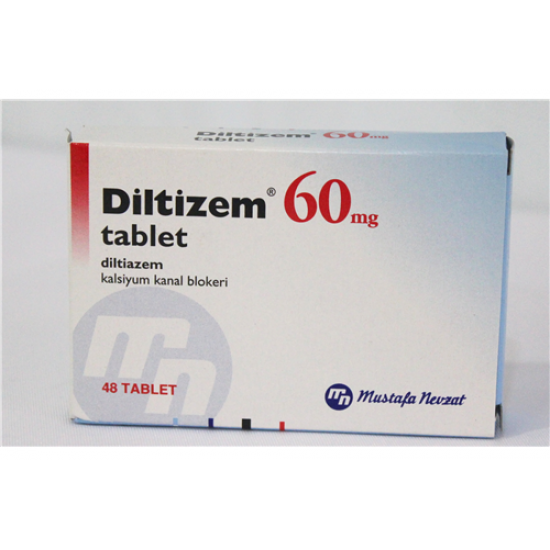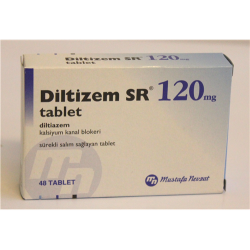Diltizem (Diltiazem) 60 mg 48 tablets

New
Diltizem (Diltiazem) 60 mg 48 tablets
$12.00
- Availability: In Stock
Diltizem (Diltiazem) 60 mg 48 tablets
COMMON BRAND NAME(S): Cardizem
USES: Diltiazem is used to prevent chest pain (angina). It may help to increase your ability to exercise and decrease how often you may get angina attacks. Diltiazem is called a calcium channel blocker. It works by relaxing blood vessels in the body and heart and lowers the heart rate. Blood can flow more easily and your heart works less hard to pump blood.
OTHER USES: This section contains uses of this drug that are not listed in the approved professional labeling for the drug but that may be prescribed by your health care professional. Use this drug for a condition that is listed in this section only if it has been so prescribed by your health care professional. Diltiazem may also be used to control your heart rate if you have a fast/irregular heartbeat (such as atrial fibrillation). Long-acting forms of diltiazem may be used to treat high blood pressure. If your doctor prescribes diltiazem to treat high blood pressure, check with your pharmacist to make sure you are getting the correct form of diltiazem.
HOW TO USE: Take this medication by mouth before meals and at bedtime, usually 3 to 4 times daily or as directed by your doctor. The dosage is based on your medical condition and response to treatment. Your doctor may gradually increase your dose. Follow your doctor's instructions carefully. Use this medication regularly to get the most benefit from it. To help you remember, use it at the same times each day. This medication must be taken regularly to prevent angina. It should not be used to treat angina when it occurs. Use other medications (such as sublingual nitroglycerin) to relieve an angina attack as directed by your doctor. Consult your doctor or pharmacist for details. Tell your doctor if your condition worsens (for example, your chest pain worsens or is more frequent).
SIDE EFFECTS: Dizziness, lightheadedness, weakness, nausea, flushing, and headache may occur. If any of these effects persist or worsen, tell your doctor or pharmacist promptly. To lower the risk of dizziness and lightheadedness, get up slowly when rising from a sitting or lying position. Remember that your doctor has prescribed this medication because he or she has judged that the benefit to you is greater than the risk of side effects. Many people using this medication do not have serious side effects. Tell your doctor immediately if any of these unlikely but serious side effects occur: fainting, slow/irregular/pounding/fast heartbeat, swelling ankles/feet, shortness of breath, unusual tiredness, unexplained/sudden weight gain, mental/mood changes (such as depression, agitation), unusual dreams. Tell your doctor immediately if any of these rare but very serious side effects occur: severe stomach/abdominal pain, dark urine, persistent nausea/vomiting, yellowing eyes/skin. A very serious allergic reaction to this drug is rare. However, seek immediate medical attention if you notice any symptoms of a serious allergic reaction, including: rash, itching/swelling (especially of the face/tongue/throat), severe dizziness, trouble breathing. This is not a complete list of possible side effects. If you notice other effects not listed above, contact your doctor or pharmacist.
PRECAUTIONS: Before taking diltiazem, tell your doctor or pharmacist if you are allergic to it; or if you have any other allergies. This product may contain inactive ingredients, which can cause allergic reactions or other problems. Talk to your pharmacist for more details. This medication should not be used if you have certain medical conditions. Before using this medicine, consult your doctor or pharmacist if you have: certain types of heart rhythm problems (such as sick sinus syndrome/atrioventricular block unless you have a pacemaker). Before using this medication, tell your doctor or pharmacist your medical history, especially of: liver disease, kidney disease, heart failure. This drug may make you dizzy. Do not drive, use machinery, or do any activity that requires alertness until you are sure you can perform such activities safely. Limit alcoholic beverages. Before having surgery, tell your doctor or dentist that you are taking this medication. This medication should be used only when clearly needed during pregnancy. Discuss the risks and benefits with your doctor. This drug passes into breast milk and may have undesirable effects on a nursing infant. Consult your doctor before breast-feeding.
DRUG INTERACTIONS: Your doctor or pharmacist may already be aware of any possible drug interactions and may be monitoring you for them. Do not start, stop, or change the dosage of any medicine before checking with your doctor or pharmacist first. Before using this medication, tell your doctor or pharmacist of all prescription and nonprescription/herbal products you may use, especially of: amiodarone, digoxin, fingolimod. Other medications can affect the removal of diltiazem from your body, which may affect how this medication works. Examples include atazanavir, cimetidine, quinidine, St. John's wort, azole antifungals such as ketoconazole, macrolide antibiotics such as erythromycin, rifamycins including rifabutin and rifampin. Diltiazem may also affect how your body gets rid of many drugs (such as buspirone, cyclosporine, sirolimus, certain statins including lovastatin, certain anti-seizure drugs including carbamazepine, certain benzodiazepines including triazolam and midazolam). Check the labels on all your medicines (such as cough-and-cold products, diet aids) because they may contain ingredients that could increase your heart rate and worsen chest pain (including caffeine, pseudoephedrine, phenylephrine). Ask your pharmacist about using these products safely. Cimetidine is a nonprescription drug that is commonly used to treat extra stomach acid. Because cimetidine may interact with diltiazem, ask your pharmacist about other products to treat extra stomach acid. This document does not contain all possible interactions. Therefore, before using this product, tell your doctor or pharmacist of all the products you use. Keep a list of all your medications with you, and share the list with your doctor and pharmacist.
OVERDOSE: If overdose is suspected, contact your local poison control center or emergency room immediately.
NOTES: Do not share this medication with others. Laboratory and/or medical tests (such as kidney/liver function tests, pulse, blood pressure, EKG) may be performed from time to time to monitor your progress or check for side effects. Consult your doctor for more details. There are different brands and types of this medication available. Many do not have the same effects. Do not change brands or types without consulting your doctor or pharmacist.
MISSED DOSE: If you miss a dose, take it as soon as you remember. If it is near the time of the next dose, skip the missed dose and resume your usual dosing schedule. Do not double the dose to catch up.
STORAGE: Store at room temperature at 68-77 degrees F (20-25 degrees C) away from light and moisture. Do not store in the bathroom. Keep all medicines away from children and pets. Different brands of this medication may have different storage needs. Ask your pharmacist about the brand you are using. Do not flush medications down the toilet or pour them into a drain unless instructed to do so. Properly discard this product when it is expired or no longer needed. Consult your pharmacist or local waste disposal company for more details about how to safely discard your product.

